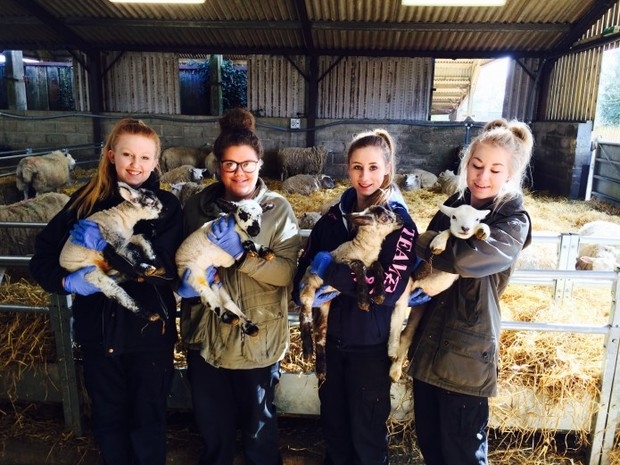Finding the right lambing staff

Lambing can be a busy time on any sheep farm, making the need for good lambing staff essential. Many flocks rely on students to take up the slack at lambing, but how can you ensure you get the staff you need while giving students the lambing experience they require?
Hannah Park of the National Sheep Association (NSA), which runs its ‘Lambing List’ service to help students find placements, says the first thing farmers need to do is evaluate the level of help they need.
“Students looking for lambing placements will have varying degrees of experience and knowledge. If you’re looking for highly experienced staff then it may be that placement students aren’t the best fit for you.
“However, if you’re looking for young, keen staff with a thirst for knowledge and a willingness to learn then placement students can be a valuable source of labour,” she explains.
Miss Park says many farmers are more than happy to provide training for students and enjoy passing on their knowledge to a new generation of people in the industry.
“It is important when you advertise to be clear about what level of experience and skills you require and give a good description of the duties you expect placement students to undertake.
“Some students may be comfortable working in large, busy flocks while others may prefer a more small scale system, it is important to check with the students what they’re expecting from their placement and if you don’t think your expectations and theirs match then don’t be afraid to say so.”
Lambing work experience
As most students looking for placements are simply looking for work experience there is no obligation on farmers to pay them a wage, but some farmers may choose to do this, adds Miss Park. Students are looking for placements as part of their learning programme so don’t generally expect payment.
“However, this is something which should be discussed up front. Students looking for placements generally appreciate that they won’t be paid, but some may expect some form of payment and you need to be clear about this from the start.
“If you’re going to offer some payment it is worthwhile speaking to your accountant to ensure you comply with the necessary regulations on that front. Also make sure you are clear how long you want the students for. Some will be looking for longer placements than others, so be clear on that too.”
Additionally, farmers should be clear on whether they will provide accommodation, meals and any necessary protective clothing. “Many placement students will be taking work some distance from home, so may well expect some sort of accommodation and meals to be provided, again be up front about what you will and won’t provide and the same applies to working hours and breaks etc.
“When everyone knows where they stand then it can save a lot of embarrassment and awkwardness later. There is nothing worse than either party feeling the other isn’t being fair or open. No one is expecting a formal interview for what can be quite a short placement, but it’s worth having a detailed chat on the phone to ensure you both get a chance to ask any relevant questions.”
Lambing procedures
Once students start on-farm it is important to give them a full run down on the farm, the system and what you’re expecting them to do. “Every farm is different and every farmer has a different way of doing things, so it is vital you explain any basic protocols to students so they know what to do.
“Do you use particular medications or have a certain way of doing things? If so unless you explain this to students, you can’t expect them to do things the way you’d like them done. When you expect students to use machinery or undertake certain husbandry tasks, such as castration, make sure you give any relevant tuition and that students are comfortable doing what you’ve asked them to,” she explains.
Miss Park adds that farmers shouldn’t feel obliged to take the first student who contacts them looking for a placement. “When you don’t feel the student will fit with your farm and system then don’t be afraid to say so. It is better for both the farmer and the student to get the staff they need and the placement they need.
“I’d encourage farmers to allow students to get involved with every aspect of lambing they feel comfortable with, but equally to appreciate that some students won’t feel as comfortable doing some things as others. Some may be happy being left alone for a significant period of time or doing night lambing on their own and some won’t.
“Students must be encouraged to ask questions and this should be made clear at the start. When students aren’t happy about something they need to feel they can ask about it and farmers need to be willing to take the time to explain things.”
Overall though, the key for a successful lambing placement is for everyone involved to be open and honest from the start. “If it’s experienced, self-sufficient lambing help you want then placement students may not be appropriate, but equally if you are willing to help students learn and progress than having students on the farm can be a rewarding experience.”
Find out more about the National Sheep Association 'Lambing List'.
Our website contains a wealth of resources for both farmers and students, including our Handy Lambing Guide for handy information to get you through the lambing season. We have also put together a number of practical demonstrations which you may find useful for your placement lambing staff.